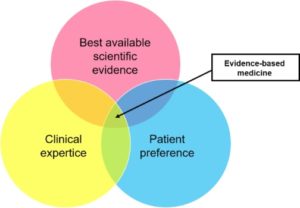Evidence-Based Health Care
The practice of Evidence-Based Health Care is to base your clinical decisions on the best available scientific evidence, together with clinical expertice and your patients preferences.

Evidence-Based Health Care involves four steps:
- Defining a clinically relevant question
- Searching for the best Evidence
- Critically appraising the Evidence
- Applying the Evidence
1. Defining a clinically relevant question
The good practice with EBM starts with a well formulated clinical question and you can use a framework like PICO to construct your question. PICO usually contains four elements:
| Patient/problem | Intervention | Control/comparison | Outcome |
|---|---|---|---|
How would I describe my patient? Age, male/female, condition or diagnosis. |
Which main intervention am I considering? Tests, drug, or treatment. |
What is the main alternative to compare with the intervention? Standard care, placebo or no comparison. |
In what aspect will this effect my patient? Quality of life, mortality or comorbidities. |
If you have a qualitative research question, then you can use the PEO framework. Below is an example how you can structure a qualitative research question using PEO.
Research Question: How do ambulance personnel experience work-related stress?
| Population | Exposure | Outcome |
|---|---|---|
Ambulance personnel |
Work-related stress |
Experience |
You don’t have to use all the elements of the PICO or PEO when you start searching, for example if you don’t have a comparison in PICO you can leave that out.
2. Searching for the best Evidence
In the list of all the databases, you can choose Evidence Based Medicine as a subject to see all the resources.
- Start the search by looking for a systematic review that has collected and analyzed the existing research on the topic:
Cochrane Systematic Reviews is a good place to start.
SBU conducts systematic reviews in Swedish. - If you don’t find any reviews then try searching in other clinical sources for evidence:
Search DynaMed to get evidence-based recommendations for treatment, diagnosis and prevention.
Search Clinical Key to find published clinical studies, medical ebooks, pictures and First Consult treatment guides. You can browse a certain specialty.
In TRIP to find systematic reviews, clinical guidelines, websites, pictures and published clinical studies.
1177 för vårdpersonal (previously Nationellt kliniskt kunskapsstöd) is the regions’ joint knowledge support for everyone who works in health care in Sweden. The content is written and quality assured by experienced healthcare personnel around the country and includes care programs and guidelines. - VISS contains national clinical guidelines for caregivers in the Stockholm Region.
- Vårdhandboken offers clinical guidelines, methods and tools for treatment and care based on science and proven experience.
- If you still haven’t found answer to your question then you can search for research studies in
PubMed. Apply search filters to limit to a specific category to find systematic reviews or other studies.
3. Critically appraising the Evidence
It is important to assess the quality of the studies you have found. Use CASP critical appraisal tools when you assess Randomised Controlled Trials, Systematic Reviews, Qualitative Research and Economic Evaluations.
4. Applying the Evidence
- Is the evidence generalisable? Is it applicable to my patient / my question?
- Are the benefits of this intervention larger than the possible side effects?
- How strong is the evidence?
- GRADE is an international grading system, often used to assess if the body of evidence found is strong or limited.
Book a librarian to learn more about searching for scientific articles.
